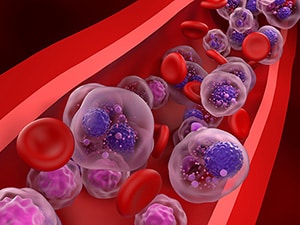A New Multiple Myeloma Indication for Daratumumab and Hyaluronidase-fihj
The targeted therapy was approved by the FDA for use in combination with bortezomib, lenalidomide, and dexamethasone.
The U.S. Food and Drug Administration (FDA) has approved daratumumab and hyaluronidase-fihj (Darzalex Faspro), plus bortezomib, lenalidomide, and dexamethasone, for use in the induction and consolidation phases of therapy in patients with newly diagnosed multiple myeloma who are eligible for a stem cell transplant.
Daratumumab is a targeted therapy that binds to the protein CD38 on a subset of B cells called plasma cells, from which multiple myeloma arises. Hyaluronidase-fihj is an enzyme that breaks down hyaluronan, a component of the extracellular matrix. Since the extracellular matrix acts as a barrier between cells and their surrounding environment, breaking it down helps daratumumab reach the multiple myeloma cells.

Bortezomib is a drug that inhibits the proteasome, a complex that breaks down and recycles proteins in the cell. Lenalidomide is an immunomodulatory drug that helps stimulate T-cell activation. Both have been approved in various combinations for the treatment of multiple myeloma and are often given with dexamethasone, a steroid that helps to mitigate some side effects of anticancer therapy.
Daratumumab and hyaluronidase-fihj has been previously approved as a monotherapy or in combination with various drugs for seven other indications in adult patients with multiple myeloma.
The current approval was based on results from the open-label, randomized, active-controlled, phase III PERSEUS clinical trial, which enrolled 709 patients with newly diagnosed multiple myeloma who were eligible for a stem cell transplant. Three hundred fifty-four patients were randomly assigned to receive bortezomib, lenalidomide, and dexamethasone (control arm), and 355 patients were randomly assigned to receive daratumumab and hyaluronidase-fihj plus bortezomib, lenalidomide, and dexamethasone (experimental arm).
Patients in the experimental arm had a 60% lower risk of disease progression or death than patients in the control arm. The median progression-free survival (the time from the start of therapy to disease progression or death) was not reached in either arm.
Daratumumab and hyaluronidase-fihj is given as an injection under the skin of the abdomen. The recommended dose is 1,800 mg of daratumumab with 30,000 units of hyaluronidase.
Multiple myeloma is a blood cancer that occurs when abnormal plasma cells accumulate in the bone marrow and form tumors in bones or soft tissue. According to federal statistics, it was estimated that 35,780 individuals would be diagnosed with multiple myeloma and 12,540 patients would die of the disease in the United States in 2024.
The FDA rendered its decision on July 30, 2024.